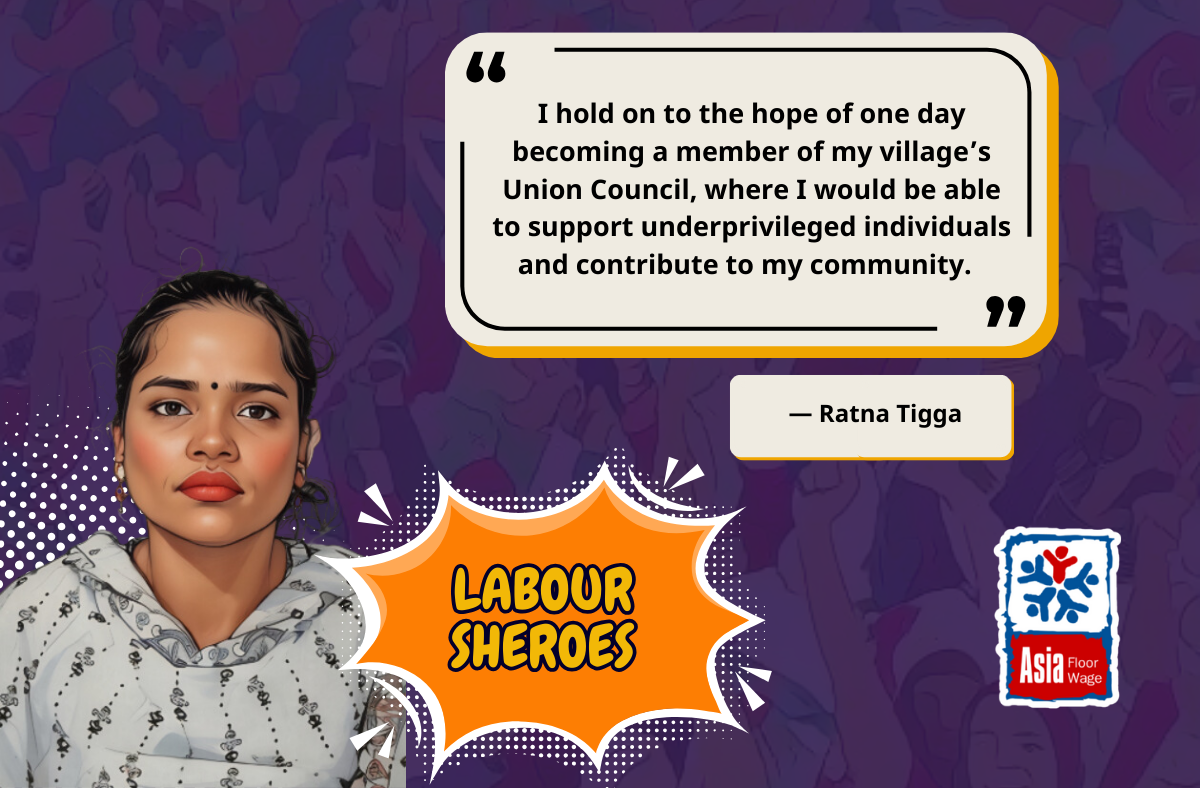From Football Fields to Factory Floors: Ratna’s Fight for Dignity and Justice in the Workplace

By Ratna Tigga
Growing up in Bangladesh, Ratna faced the constant struggle of poverty, which left an indelible mark on her childhood and education. Despite her passion for football and her dreams of playing for the national team, financial constraints and familial obligations forced her to put her aspirations on hold. Now, as a garment worker and a mother, Ratna continues to fight against workplace abuse and systemic issues within the industry, while holding onto the hope of one day making a difference in her community.
–
I am Ratna, a 29-year-old garment worker from Bangladesh. I grew up in my grandmother’s village home, where financial hardship was a constant companion. My father struggled with addiction and contributed very little to our family’s income, leaving my mother to carry the heavy burden of supporting us. Despite her relentless efforts, there was never enough money for the basics.
During my early years, I found comfort in playing with my aunt, who was the same age as me. But when I moved back to live with my parents, things did not get better. My mother enrolled me in school, but the stigma of poverty followed me. My classmates would exclude me because I wore worn-out clothes and didn’t have the school supplies, they did. This exclusion made me feel isolated and, at times, deeply sad.
In primary school, I joined the football team, and it quickly became my passion. The tournaments were the highlight of my youth days, and I dreamt of playing for the national team. Filled with energy and camaraderie, those were the happiest days of my life. I kept playing until I completed my secondary exams, holding onto that dream even as life threw more challenges my way.
After completing my secondary exams, my father abruptly stopped my studies, sending me to live with an aunt. But I was determined to continue my education. I convinced my aunt to allow me to attend college, promising to help with the household chores in return. However, despite my hard work, financial constraints were always a barrier.
When I needed 2,000 takas to register for my final exams, my aunt refused to help. She gave me only 100 takas and sent me back home. Eventually, my parents sold a goat to get the funds, but by then, my preparation for the exams had been inadequate, and I failed one subject. Looking back, I often reflect on how poverty and the constant struggle for resources prevented me from reaching my full potential.
In 2015, I got married and moved to Dhaka with my husband. I had heard that women could earn a decent living by working in garment factories, so I quickly found a job as a helper in one. My starting wage was 5,300 takas, which was barely enough to support us, especially since my husband was unemployed for the first year. I recall having only one dress, which I would wash every evening so I could wear it to work the next day.
Eventually, I persuaded the factory’s general manager to offer my husband a job. His employment improved our financial situation significantly, and we managed to live more comfortably.
One of the hardest aspects of my work has been dealing with abuse. From the moment I started, I faced verbal insults, including derogatory remarks about my parents, from line supervisors and managers. This treatment upset me deeply at first, but over time, I learned to stand up for myself and my fellow workers. Now, I actively support new workers, who are often the main targets of such abuse, and I advocate for a more respectful work environment.
Although there have been improvements, such as the elimination of physical punishment, I still believe that excessive production targets and demeaning language remain major issues that impact workers’ mental health and personal lives.
I dream of a life beyond the garment industry. I often wish I had been able to continue my education, which might have allowed me to pursue a better job. Despite everything, I hold on to the hope of one day becoming a member of my village’s Union Council, where I would be able to support underprivileged individuals and contribute to my community.
The happiest moment of my life was the birth of my daughter, now six years old. My husband and I are united in our ambition to give her the best possible future, and we dream of her becoming a doctor or an engineer.
My story reflects the resilience and struggles of garment workers in Bangladesh. From overcoming financial hardship to fighting for justice in the workplace, I continue to push forward, striving for a better life for myself and my family. My journey highlights the systemic issues within the garment industry and the need to empower workers to pursue their dreams. I hope my story can inspire others to keep fighting for a better future.
–
Ratna’s story is a part of ‘Labour Sheroes,’ an initiative under the 16 Days of Activism campaign by Asia Floor Wage Alliance. Through this series, we share the stories of women garment workers from South and Southeast Asia who are breaking barriers, fighting against workplace violence and harassment, and leading the change for better working conditions in the global garment industry.
